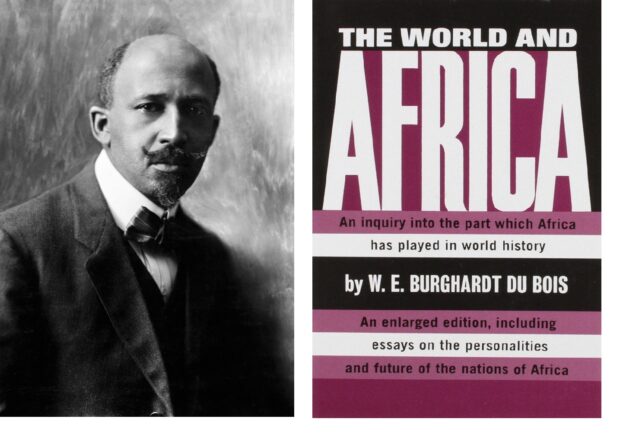
In The World and Africa: An Inquiry into the Part Which Africa Has Played in World History (1947), W. E. B. Du Bois does what few have dared to do: he rewrites the historical narrative of Africa. In a time when colonialism was still entrenched and Africa’s contributions to world civilisation were systematically erased or downplayed, Du Bois offered a bold counterpoint to the prevailing ideas of his time. His book isn’t just a historical account; it’s a declaration—a passionate call to reclaim Africa’s rightful place in the story of human history.
Reclaiming Africa’s True Legacy
Du Bois opens the book by confronting the persistent myth of Africa as a “dark continent”—a place with no history, no civilisation, and no contributions to the global stage. In The World and Africa, Du Bois tears down these damaging stereotypes, showing that Africa is, in fact, the cradle of civilisation. He takes us back to the great empires of Africa: the ancient Egyptian civilisation, the Mali Empire, Ghana, Songhai—kingdoms that were rich in knowledge, culture, and political sophistication long before the arrival of Europeans.
For Du Bois, this isn’t just about recounting facts—it’s about empowerment. He wants readers, especially Black readers, to understand that Africa’s history is not a blank page but a rich, vibrant story that deserves to be recognised globally. By challenging the standard Western narrative, Du Bois sets out to dismantle the racial and cultural hierarchies that have long positioned Africa as inferior. His message is clear: Africa has always been central to world history, and it’s time we start telling the full story.
A Powerful Critique of Colonialism and Racism
At its core, The World and Africa is also a direct critique of colonialism. Du Bois is unflinching in his criticism of the Western powers that exploited Africa for centuries, not only extracting its resources but seeking to erase its culture and history. He rejects the so-called “civilising mission” of European powers and paints a stark picture of the lasting damage caused by colonial rule.
For Du Bois, the question isn’t just about the history of Africa—it’s about how that history has been distorted by racism. He asks us to consider how Europe’s colonial agenda has shaped the way we think about race and power. Colonialism wasn’t a benign institution—it was a violent and dehumanising system that left deep scars on Africa’s people and its cultural heritage. By confronting this history head-on, Du Bois challenges us to reassess our own understanding of race and power, and to understand how these systems continue to shape the modern world.
Pan-Africanism and a Vision for Africa’s Future
What makes Du Bois’ work truly revolutionary is how he ties Africa’s past to its future. As a lifelong Pan-Africanist, Du Bois saw the liberation of Africa as inseparable from the liberation of Black people worldwide. His book is not just an intellectual exercise—it’s a vision for global solidarity among people of African descent. For Du Bois, Africa’s future is one of empowerment, where African nations reclaim their cultural, political, and economic strength.
Written during the early stages of African independence movements, The World and Africa is imbued with hope and optimism. Du Bois envisions a future where Africa plays a central role on the world stage—not as a victim of colonialism, but as a leader in the global community. His Pan-African vision is one where Black people across the globe unite to confront the legacy of oppression and build a new future.
Why Du Bois’ Message Still Matters Today
Though The World and Africa was published over 70 years ago, its relevance is undeniable. In a world still marked by the legacies of colonialism, Du Bois’ work continues to resonate. The book offers a much-needed corrective to the way Africa is represented in history, challenging readers to rethink the narratives we’ve inherited. But it’s not just about looking back—it’s about looking forward, too. Du Bois gives us the tools to understand how Africa’s history shapes the present and how its future is still being forged.
In today’s world, where Africa continues to confront the enduring effects of colonialism, Du Bois’ call for recognition and empowerment is as urgent as ever. His work reminds us that Africa’s history is not just the story of a continent—it is the story of the world. By reclaiming Africa’s past, we open up a future where Africa’s full contributions are acknowledged and celebrated.
For anyone interested in understanding the true history of Africa and its role in shaping the modern world, The World and Africa is a must-read. It’s not just a history book—it’s a manifesto for the recognition of Africa’s rightful place in the global narrative. You can find The World and Africa available on Amazon here.
